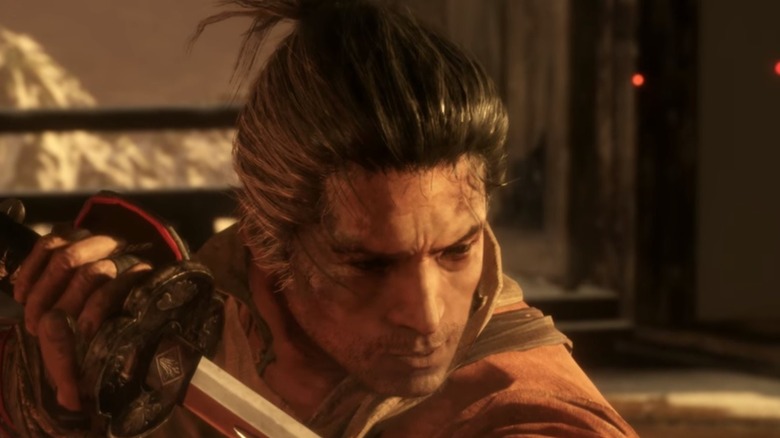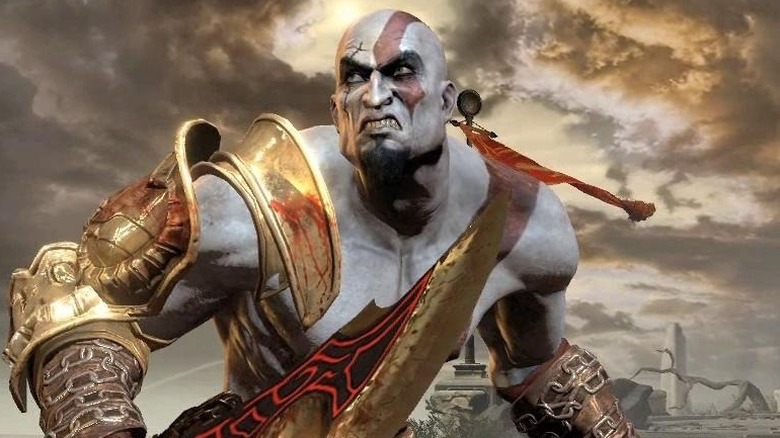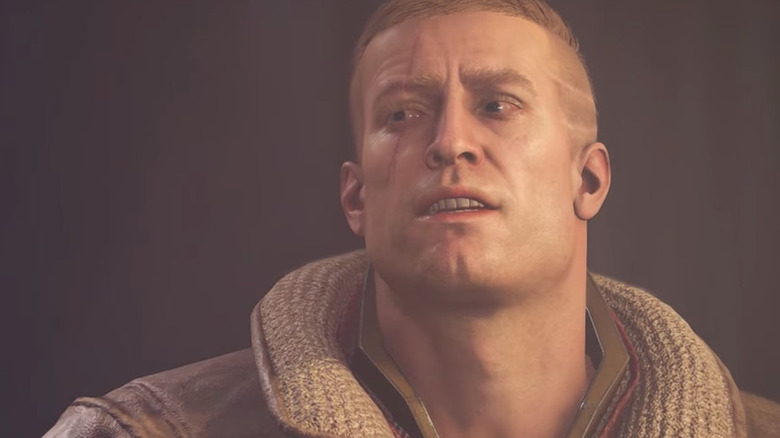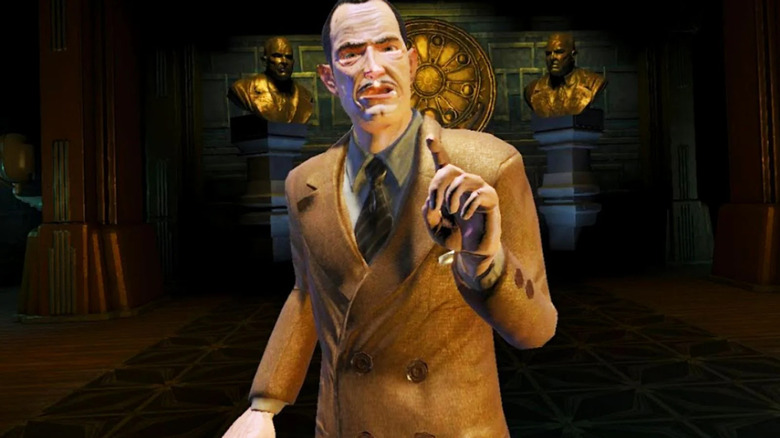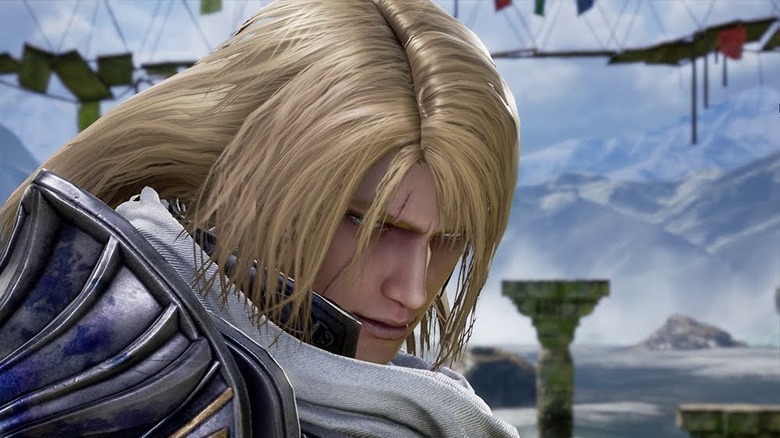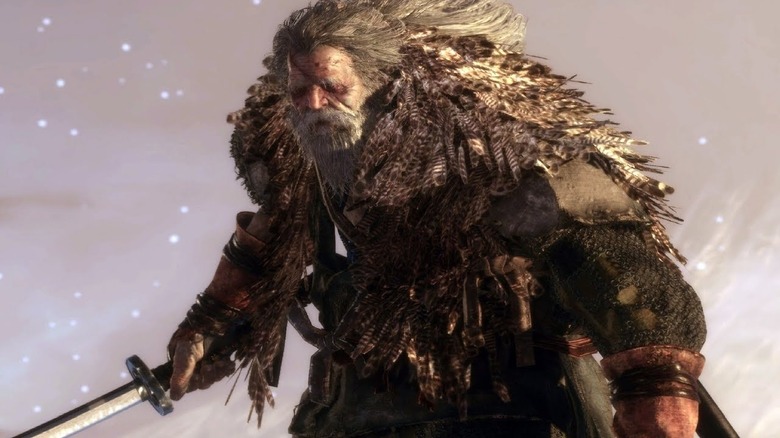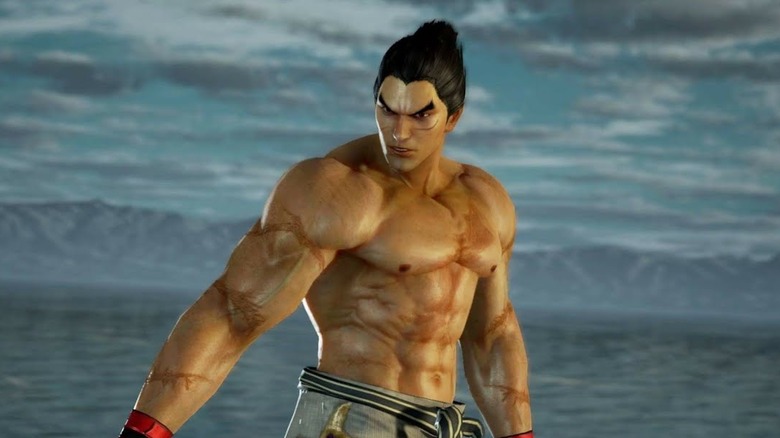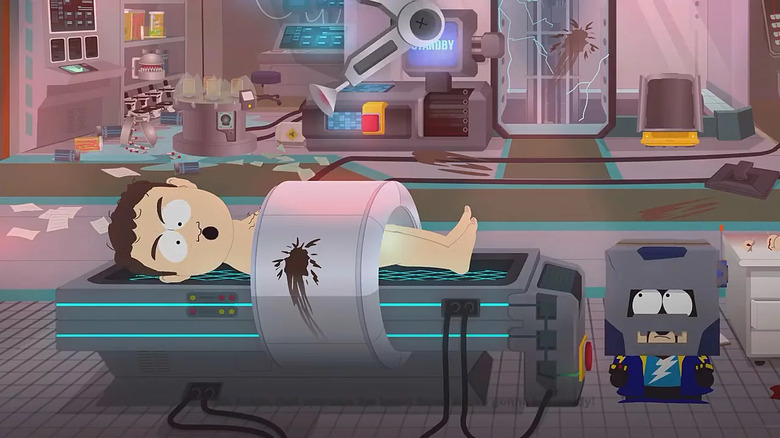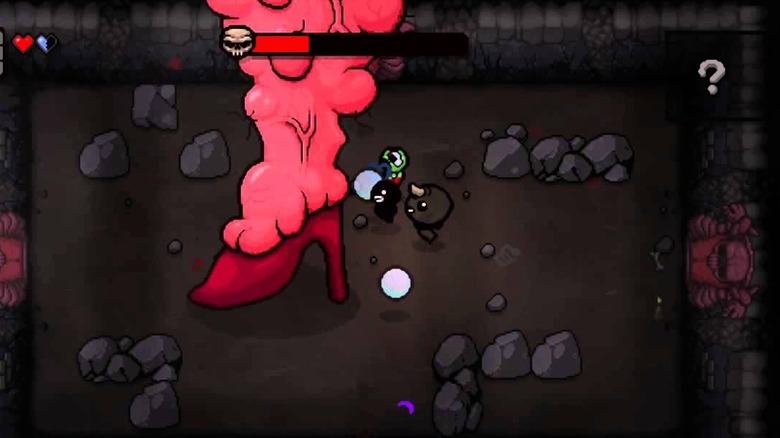Gaming Heroes Who Killed Their Own Parents
When we think of heroes in video games, we often think of puzzle-solving warriors like Link from "The Legend of Zelda" and galaxy-saving commanders like Shepard from "Mass Effect." It's true that many video game narratives are, at their core, basic power fantasies that place you in the shoes of a mighty hero, but this isn't always the case. In fact, given the violent nature of many popular games, the protagonists you control usually end up with quite a bit of blood on their hands. Sometimes this is justified, and sometimes you are simply meant to play as the bad guy. At other times — it gets personal.
Throughout the history of games, there have been a handful of lead characters who have been put in the position of killing one or both of their parents. Whether they were tricked into it or simply have to remove a villainous force from the world, the following gaming heroes have ended up doing the unthinkable.
Beware of major spoilers ahead for the following games.
Kratos - God of War 3
Kratos is a violent guy — fans know this — but even among video game protagonists, he takes it to a new level. Originally rooted in Greek mythology, the antihero at the center of "God of War" is a vengeful being who wants nothing more than the bloody end of those who betrayed him. Not only does he kill his wife and child (while bewitched by Ares, yes, so it's a little understandable), but in "God of War 3," Kratos ends up killing his own father.
In "God of War 2," the god Zeus kills Kratos, sending him to the underworld and kicking off a whole new journey. Once Kratos reaches the end, he attempts to kill Zeus again, but the goddess Athena won't let him and jumps on his blade. Athena reveals to Kratos that he is the son of Zeus, which only enrages him further. In "God of War 3," Kratos finally goes through with the deed. The game's epic premise actually sees him killing the entire pantheon of Greek Gods, eventually leading him to a brutal confrontation where he beats his father to a bloody pulp and stabs him with a magic blade. Yup, that is definitely the Kratos gamers know and love.
B.J. Blazkowicz - Wolfenstein 2: The New Colossus
Machine Games rebooted the "Wolfenstein" franchise with 2014's "The New Order." This acclaimed shooter made the series relevant for the first time in a decade by making its hero, the Nazi-killing machine B.J. Blazkowicz, more of a well-rounded character. Balancing camp and serious storytelling allowed B.J. to become a tragic hero in both "The New Order" and its sequel "The New Colossus."
In "Wolfenstein 2: The New Colossus," B.J. is forced to reckon with his past. Players learn about his abusive white supremacist father and even play through some of his traumatic childhood memories. The game clues players into B.J.'s connection to his mother amid his father's terror. And then, about halfway into the game, B.J. takes a visit to his childhood home in Texas.
At the end of a cutscene that shows the old man hasn't changed his ways one bit — even going so far as to give his wife over to the Nazis — he puts a gun to B.J.'s head. B.J. shoves him and you are suddenly in control, forced to make the split-second decision to either kill his dad or be killed. All you have is an axe, which first takes the man's hand clean off. The following scene is one of the most shocking (and cathartic) sequences in an infamously censored game full of memorable and horrific moments.
Jack - Bioshock
The big twist every player remembers from "BioShock" is the game's famous "Would you kindly?" moment. In this landmark game, the connections between the player character of Jack and Rapture's megalomaniacal creator, Andrew Ryan, run deeper than the game explicitly tells you. Audio logs throughout the game lay out the pieces that heavily imply Jack is the illegitimate son of Andrew Ryan. The game provides plenty of evidence to the fact, even including the hint that Rapture's bathyspheres only work for you because Jack shares Ryan's DNA.
Upon finally confronting him, Andrew Ryan reveals that Jack's past was faked and that he's are being controlled by anyone who says the phrase "Would you kindly." Jack flashes back to all the times his seemingly-friendly guide Atlas (who winds up being a fake persona used by Frank Fontaine) used the phrase to command him. Then, Ryan forces Jack to "kindly" beat him to death with a golf club, proving Jack has no free will of his own. This twist that has gone down in gaming history, but the added context of the relationship between Jack and Ryan makes it all the more tragic and haunting — and it's a connection that's very easy to miss.
Siegfried - Soul Edge and Soulcalibur
Siegfried and Nightmare are two staple characters within the 3D fighting franchise "Soulcalibur." In fact, they are two sides of the same character. The origin of Nightmare is a tragic one for Siegfried, one that stretches back to the franchise's earliest days.
Siegfried's woes began in the arcade with "Soul Edge," in which each of the game's 9 playable characters were warriors seeking the titular sword. Siegfried was introduced here as a German warrior who joined a roaming gang of bandits, eventually becoming their leader. During a raid one day, he accidentally killed his own father. Distraught and convincing himself that someone else must have done the deed, he sought the Soul Edge as his only respite. In the end he accomplished his goal — inadvertently giving birth to Nightmare in one ending.
By the end of "Soul Edge," Siegfried wins the titular sword, which grants him strength in the game's good ending. However, in the bad ending of the game, the power of the Soul Edge corrupts him and transforms the warrior into Siegfried's dark doppelgänger (and fellow "Soulcalibur" regular), Nightmare.
Sekiro/The Wolf in Sekiro: Shadows Die Twice
Before FromSoftware made "Elden Ring," the renowned Japanese studio released the precise action title "Sekiro: Shadows Die Twice." In this game, you play as the Wolf, a skilled shinobi whom the game is named. On the challenging quest to retrieve his pupil Kuro, Sekiro eventually comes face to face with the man who trained and raised him: his adopted father, the mighty Owl.
The Great Shinobi Owl trained and raised Sekiro as his own, but over the years, his path has strayed from his son's. At the end of the game, you are given the choice to side with Kuro or Owl. Choosing Kuro and the divine path means you will have to fight and kill your father and mentor. The Great Shinobi is no pushover, but he is one of the best bosses in "Sekiro," and depending on the ending path you take, you might even have to fight him twice. Guess they should have called the game "Owls Die Twice."
Kazuya Mishima in Tekken
When it comes to patricide and family drama, no video game series is more iconic than "Tekken." Over the course of over a dozen games (including spin-offs), the Mishima clan is defined by a legacy of fathers killing sons and sons killing fathers (via Den of Geek). This all began with Kazuya Mishima and his father Heihachi in the first "Tekken," released on PlayStation in 1994. At a young age, the cruel CEO billionaire decided he must traumatize his son to make him strong, doing so by throwing him off a cliff. Kazuya would have died, too, if not for the supernatural power of the Mishima family Devil Gene that saved his life.
The loose story of "Tekken" for the PS1 follows Kazuya decades later. After training all his life, he joins a tournament that leads to a final confrontation with his father. After beating Heihachi, Kazuya takes his revenge very literally and throws his father off the same cliff, killing him — at least until he reveals that (surprise) he is not dead in "Tekken 2."
Throwing family from high places becomes a Mishima family staple when Heihachi throws his son into an active volcano in the sequel. The saga only complicates itself when Kazuya comes back 20 years later in "Tekken 4," eventually leading to his ultimate revenge in "Tekken 7."
The New Kid - South Park: The Fractured But Whole
The sequel to 2014's "South Park: The Stick of Truth," "The Fractured But Whole" continued pushing the boundaries of gross-out humor in the only way "South Park" creators Trey Parker and Matt Stone know how. One scene is particularly gruesome, but in the cartoonish over-the-top way "South Park" fans have come to expect from the show and its related media. "The Fractured But Whole" makes you choose the unthinkable: which one of your parents to kill and which will live. The only bit of respite you get in this sequence is that at least you don't have to kill both of the New Kid's parents.
One late-game mission will take you to a DNA lab, where you will find both the mom and dad in pretty bad shape. The dad is naked and strapped into an operating table while your mom is bleeding in the other room. The New Kid will need to rip off one of their arms to use on the door to access the next room. The worst part of the whole horrid affair is that whichever parent you choose will beg you to choose the other one instead. Overall, it is a pretty upsetting scene.
Isaac - The Binding of Isaac
"The Binding of Isaac" and its sequel/remaster "The Binding of Isaac: Rebirth" are isometric rogue-like dungeon crawlers from "Super Meat Boy" creator Edmund McMillen and "Coil" developer Florian Himsl (via Game Developer). You play as Isaac, a young boy who has been bound to the basement by his evil, fanatical mother. Inspired by a biblical tale, Isaac's mother has seemingly been told by God to kill her son, and so he must navigate the monster-filled basements of their house in a fight for survival.
When you make it to the end of the prologue for "The Binding of Isaac,” the final boss you take on will be your mom. The Mom boss is represented by one large, boil-infected leg with a shoe on it that stomps down on Isaac from above. Mom isn't an easy boss, but players have to get used to dispatching her in no time. On subsequent runs, you will unlock deeper floors and discover that the basement holds much stronger entities than your mother — like, uh, Isaac's Mom's heart.

